By Daniel H. Mutibwa
Understanding the enthusiasm and value behind the preservation of local community (hi)stories
In his widely acclaimed book titled How Societies Remember published in 1989, the late British social anthropologist — Paul Connerton — made a very interesting four-fold observation about how we interact with our past and present. First, we experience our present world in ways causally connected with past events and objects. Second, we experience our present differently in accordance with the different pasts to which we are able to connect that present. Third, it is difficult to disentangle our past from our present because present factors tend to influence (but also distort) our recollections of the past. Conversely — and fourth, past factors tend to influence (but equally distort) our experience of the present. To Connerton, this interaction reaches into the most minute and everyday details of our lives (1989: 2). In putting forward this observation, Paul Connerton was discussing what he thought was the most helpful way of understanding memory in general, and social memory in particular. This discussion also engaged with the different forms and modes that individual and collective commemorative acts take.
Six years later in 1995, the late British sociologist — John Urry — picked up and built upon Paul Connerton’s observation in an article published in a very prominent academic journal called The Sociological Review. In that article titled ‘How Societies Remember the Past’, John Urry explicitly connected memory with heritage and showed particular interest in the role played by what he termed ‘non-hegemonic collective enthusiasms’ in facilitating collective remembering (1995: 51). Urry was very critical of the ways in which memory institutions typically essentialise grand narratives that reinforce conservative, elitist and selective views of past events while deflecting attention from the possibilities of incorporating a multiplicity of accounts, perspectives and actors — including the lived experiences of ordinary people. He was very concerned about how this produces a monolithic heritage that underrepresents numerous communities, groups and publics in society. One way to redress this imbalance, Urry noted, was the ‘proliferation of social groups who have sought through their enthusiasm to preserve aspects of “their” history’ (1995: 58) as part of a much broader two-pronged strategy to (1) democratise engagement with heritage work— and to do so taking a bottom-up, inclusive approach, and (2) conserve and animate heritage sustainably in ways that are relatable to the life experiences of generations of local communities.
LLLSVG — The journey to becoming Leicestershire's Steward of the local library studies collection and heritage preservation and interpretation
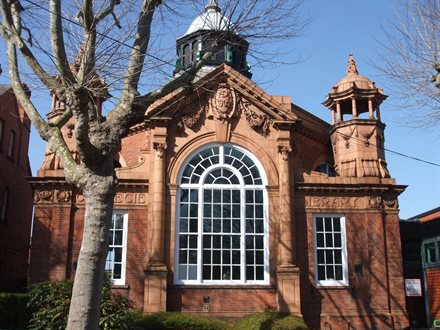 Loughborough’s Carnegie Library, 2013 © Lynne Dyer, LLLSVG
Loughborough’s Carnegie Library, 2013 © Lynne Dyer, LLLSVG
Fast forward to the late 2000s — about a decade following the publication of John Urry’s journal article cited above. The Loughborough Library Local Studies Volunteer Group (LLLSVG) — hereafter interchangeably referred to as LLLSVG and the Group — entered the picture to do precisely what John Urry outlines above and to facilitate the interaction between the past and the present that Paul Connerton observes earlier.
In an interview conversation held in early May 2023 with LLLSVG’s Chairperson (Kathy Phillips) and Treasurer (Sharon Gray) respectively, I learnt that the Group constituted itself to preserve and enhance the local studies collection based in the Local and Family History Centre at Loughborough Library for the people of Charnwood. This was a year after austerity-induced measures compelled local authorities to cut library staff jobs. Local authorities at the time were committed to supporting and delivering cultural provision in its many different facets — including library services.
That commitment has not wavered to this day, but the persistent austere conditions within which local authorities have operated mean provision cannot be sustained. To avert the spectre of the local history collection being locked up and possibly transferred to the Records Office located south of the county town, at South Wigston, LLLSVG stepped in and took stewardship of the collection on behalf of Leicestershire County Council (LCC). Ever since, the Group has operated under the auspices of the Libraries and Heritage Services within LCC and is a formally approved library service provider. This, as we are going to see below, is a considerable feat.
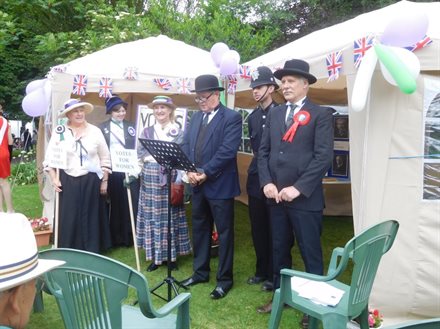 Some of the LLLSVG members at 'Picnic in the Park' in 2018, commemorating the work of the Suffragettes and the 'Votes for Women' campaign © Lynne Dyer, LLLSVG
Some of the LLLSVG members at 'Picnic in the Park' in 2018, commemorating the work of the Suffragettes and the 'Votes for Women' campaign © Lynne Dyer, LLLSVG
Within this arrangement, the Group provides extensive and varied expertise in, and rich experience and rigorously researched authoritative accounts of, local history and heritage to a range of stakeholders including Loughborough Library staff and users, members of the public, students and teachers, researchers, architects and planners, writers and artists, cyclists and walkers, local businesses, heritage agencies of different kinds and local history aficionados beyond Loughborough.
To put this in perspective, the local studies collection was originally created, staffed and used primarily by local and family historians — including academic staff at Loughborough University. Like those original local and family historians, LLLSVG members run the collection and local heritage work on a volunteering basis.
In addition to staffing the collection section during the week, LLLSVG members bring their distinctive and varied expertise in wide-ranging subject areas of local history and heritage to bear when fielding often complex queries. Many regular library staff do not possess that expertise that spans subject areas ranging from genealogy to photography to archiving to publishing to storytelling to church history among many others. The Group’s rich and extensive expertise has been conveyed, exchanged and shared with numerous stakeholders at various events — including via publications of different kinds, local heritage-themed exhibitions and talks. Here, LLLSVG’s ‘local historians, genealogists, librarian and information specialists with backgrounds in industry, education and academia’ (LLLSVG, 2022: 2) have provided a critical library service that would otherwise not exist. Naturally, the Group has become a key LCC flagship partner.
Bringing Loughborough Town's past identity to life in innovative ways
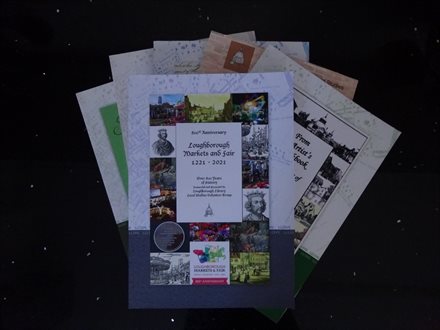
800th Anniversary of the Loughborough Markets and Fair and other publications from LLLSVG © Lynne Dyer, LLLSVG
It is worth adding that Charnwood Borough Council (CBC), which operates the markets and fair, commissioned LLLSVG to write a chapter for the book — drawing, in part, on some of the relevant objects, specimens, records, images and exhibitions at heritage venues that CBC manages on a daily basis.
As a reader, I could see the vast expertise, invaluable experience and rigorous research practice demonstrated by the contributing members of the Group shining through. I was also reminded of some of the research I have conducted that has captured the interplay between history, memory and identity across various communities and regions in the UK (Mutibwa, 2016).
Connecting that research to one of the overarching narratives of LLLSVG’s book, I could discern how the Group skilfully reconstructs and brings to life Loughborough’s markets and fair as a cornerstone of the town’s unique past identity. That past identity comes alive through acts of commemoration at the heart of which are two key aspects: (1) remembering what the town was, and (2) setting that past in relation to the present (Mutibwa, 2016: 9).
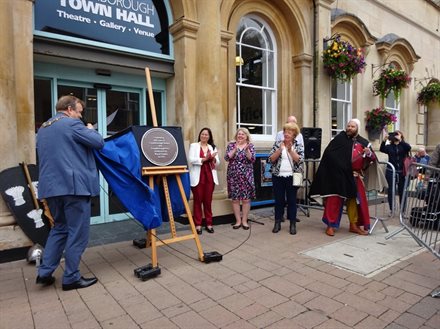 The unveiling of the commemorative plaque at the 800th Anniversary of the Loughborough Markets and Fair in 2021 © Lynne Dyer, LLLSVG
The unveiling of the commemorative plaque at the 800th Anniversary of the Loughborough Markets and Fair in 2021 © Lynne Dyer, LLLSVG
This brings us back to the point made earlier in this blog post about the different formats of individual and collective commemorative acts that Paul Connerton suggested. LLLSVG’s book identifies several such ways of remembering the heritage surrounding the town’s markets and fair over a period spanning eight centuries:
- re-enactment;
- light installations;
- exhibitions;
- banners;
- a plaque;
- a celebratory and commemorative cake; and
- commemorative mugs (LLLSVG, 2022: 96–103).
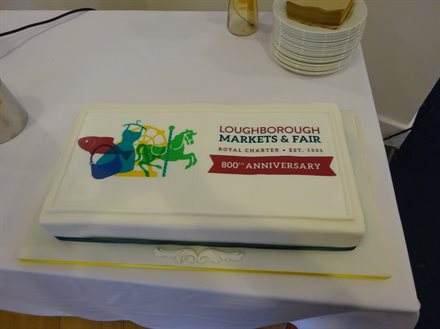 Celebratory and commemorative cake © Lynne Dyer, LLLSVG
Celebratory and commemorative cake © Lynne Dyer, LLLSVG
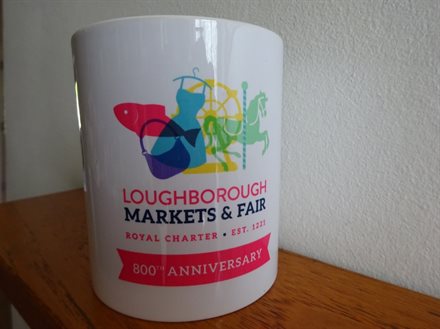 Commemorative mug © Lynne Dyer, LLLSVG
Commemorative mug © Lynne Dyer, LLLSVG
Profiling local business (hi)stories and associated local community experiential knowledge inaccessible elsewhere
 A display from an exhibition about the Loughborough Building Society, held at the public library in 2017 © Lynne Dyer, LLLSVG
A display from an exhibition about the Loughborough Building Society, held at the public library in 2017 © Lynne Dyer, LLLSVG
Unsurprisingly, 800th Anniversary: Loughborough Markets and Fair 1221 – 2021 won the Group an important Leicester and Rutland Heritage Forum Award in the category of Archives and Research [ https://www.lrhf.co.uk/heritage-awards/ ] in early October 2023. This accomplishment is clear testament to LLLSVG’s impactful heritage work in Loughborough and beyond.
Even before this major feat, the Group had undertaken local heritage projects that involved profiling some of Loughborough’s oldest established local businesses that are still trading to this day — with a particular focus on their trajectories and continuing impact on the town. That profiling exercise took the form of public displays that were exhibited at Loughborough Library.
One might argue that both the research that informed those public displays and the displays themselves generated meaningful engagement with, and (re)presentation of, local business histories and associated local community experiences very likely unavailable elsewhere to access.
Expertly shaping Loughborough Town's heritage and major regeneration projects
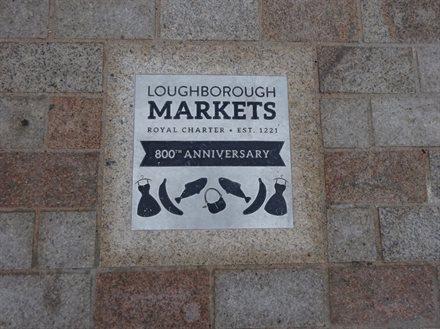 An example of the Devonshire Square heritage floor tiles, installed as part of the Bedford Square Gateway Project © Lynne Dyer, LLLSVG
An example of the Devonshire Square heritage floor tiles, installed as part of the Bedford Square Gateway Project © Lynne Dyer, LLLSVG
The Group was represented on the Loughborough Town Deal’s Community Consultation and Engagement Group committee that advised Charnwood Borough Council with respect to the town’s investment plan, which resulted in securing £16.9 million from the Government’s Towns Fund.
One of the 11 projects funded, the Bedford Square Gateway Project, was one for which consideration was called for on how best to incorporate local heritage into this, a major regeneration venture.
In particular, much of the heritage content (e.g., names of prominent local personalities, place names) inscribed on the decorative paving stones in the new pedestrianised areas as a means to celebrate and memorialise Loughborough’s past were contributed by LLLSVG.
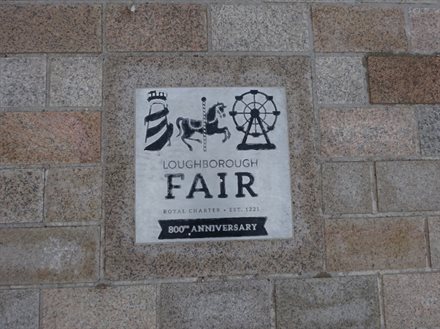 Another example of the Devonshire Square heritage floor tiles, installed as part of the Bedford Square Gateway Project © Lynne Dyer, LLLSVG
Another example of the Devonshire Square heritage floor tiles, installed as part of the Bedford Square Gateway Project © Lynne Dyer, LLLSVG
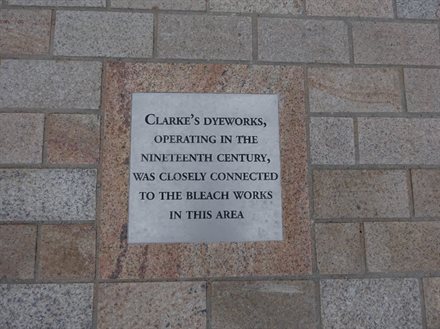 Yet another example of the Devonshire Square heritage floor tiles, installed as part of the Bedford Square Gateway Project © Lynne Dyer, LLLSVG
Yet another example of the Devonshire Square heritage floor tiles, installed as part of the Bedford Square Gateway Project © Lynne Dyer, LLLSVG
The Group’s important contribution here cannot be understated considering that the Bedford Square Gateway Project was a major collaborative venture funded by CBC, the Loughborough Town Deal and the Leicester and Leicestershire Enterprise Partnership (LLEP) — all of whom are key players in the creative, cultural and heritage economies across the county of Leicestershire and beyond. Besides LLLSVG’s growing visibility and influence on the local heritage scene in Loughborough and farther afield, the Group has gradually and very deservedly become the ‘go-to source’ for expert knowledge on the local history of Loughborough. This is unmistakeably underlined by the fact that CBC, on its bespoke website that promotes the town’s local tourism economy, advises the public to consult LLLSVG on its ‘wealth of knowledge about [the town’s] local history’ (Discover Charnwood, 2023: n.p).
From group 'enthusiasms' to powerful county-wide heritage and regeneration movers and shakers
Where John Urry would see the Group’s heritage work as mere ‘collective enthusiasms’, I see that same work very, very differently. I see that critical work as a distinctive product of powerful local heritage movers and shakers who take an inclusive and bottom-up approach to engagement with, and preservation of, Loughborough’s history. I am in complete agreement with Paul Connerton about how the Group’s heritage work commemorates the town’s past in numerous and effective ways — thanks to the varied and distinctive expertise, complementary competencies and diverse lived experiences that LLLSVG members bring along to what they do enthusiastically. Those members view and treat their heritage work as part of a wider strategy to conserve and memorialise the past in ways that people in Loughborough and beyond can relate with. At times, this takes the form of animating past lived realities — individual and collective alike and how those historical realities shape the present. For example, I think about how the markets and fair in the town over time, by adding ‘colour, vibrancy and atmosphere […] bring in thousands of people each week to Loughborough which is very important to [the town’s] local economy’ (LLLSVG, 2022: 107). At other times, the Group’s work provides a space to reflect on, and document, how individual and collective past aspirations, dreams and hopes have materialised and how they have been remembered. That space also allows opportunities to reflect on, and record, why those aspirations, dreams and hopes may not have materialised and whether or not they are remembered or consciously forgotten.
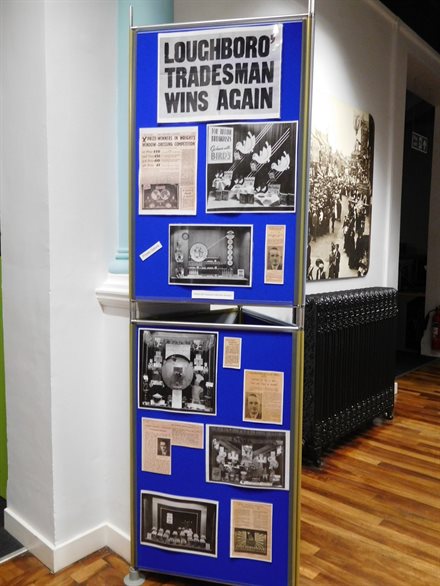 An example of local businesses on display in the George Hill exhibition in 2015 © Lynne Dyer, LLLSVG
An example of local businesses on display in the George Hill exhibition in 2015 © Lynne Dyer, LLLSVG
For instance, I think about the accounts captured in public displays created by LLLSVG of the oldest, established local businesses in Loughborough that are still trading. I cannot help but wonder what those accounts reveal about scenarios that could have been — had different business and/or organisational decisions been made. The same can be said of opportunities that local businesses feel have been missed for a range of different reasons.
Of utmost interest and relevance is learning about the impact these events may have had both on the businesses themselves, the town as a whole and the wider East Midlands region and possibly beyond. Equally important is finding out the ways in which these events may have had a direct or indirect impact on what the local business landscape and climate have shaped up to become over time.
Ultimately, the Group’s proven ability to bring formal written local discourses and (hi)stories into critical and productive dialogue with the perspectives of local communities is contributing to a multivocal and rich interpretation and (re)presentation of Loughborough’s history and heritage. This effectively counters the production of the monolithic heritage that John Urry and others have raised serious concerns about.
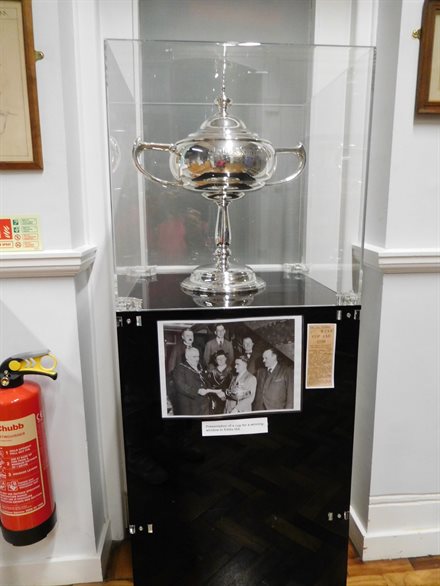 Another example of local businesses on display in the George Hill exhibition in 2015 © Lynne Dyer, LLLSVG
Another example of local businesses on display in the George Hill exhibition in 2015 © Lynne Dyer, LLLSVG
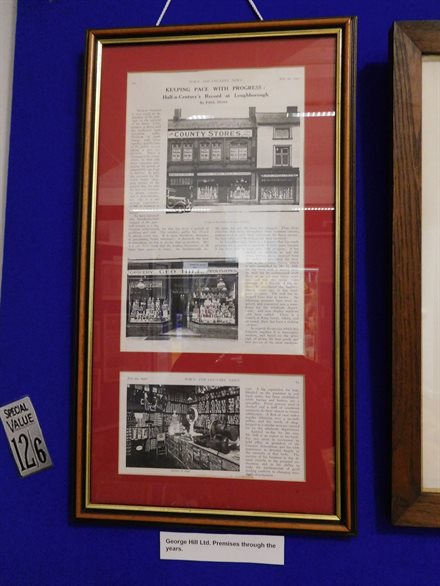 Yet another example of local businesses on display in the George Hill exhibition in 2015 © Lynne Dyer, LLLSVG
Yet another example of local businesses on display in the George Hill exhibition in 2015 © Lynne Dyer, LLLSVG
Applauding LLLSVG work as exceptional community engagement in heritage and regeneration across Leicestershire
Bringing together formal historical accounts and the words, lived experiences, artefacts and memories of the people involved is quite empowering because it allows people to shape what is meaningful and of enduring value to them. It gives people the opportunity to shape the collective memories of their pasts and to control the means through which the associated stories are told, retold, understood and (re)interpreted in their rightful and/or fitting contexts. This reflects what I understand to be community engagement in heritage work. The work by LLLSVG described in this blog post could not capture exceptional community engagement in heritage work any better. At a time when LCC is preparing the groundwork for aligning culture- and heritage-based provision across Leicestershire more effectively and strategically via a Cultural Strategy, the Group’s portfolio of work, growing status and outstanding contributions are going to feature prominently in pointing the way to developing democratic partnerships between local authorities and local community groups around community engagement in creative, cultural and heritage work — both within Leicestershire and beyond.
Notes
- This post first appeared on Lynne About Loughborough blog.
- You can see more of the LLLSVG and some of their work on the Culture Leicestershire website, where they are featured for one of their recent exhibitions, and for some extensive family history work they undertook and also at the Volunteering Day held at County Hall in March 2023.
- If you would like to follow the work of the LLLSVG you can find them on X: @Loughlibvol and on Instagram: @lllsvgroup
- Contact details for the Local Studies collection at Loughborough Library (follow the sign to the Local and Family History Centre), including opening hours, can be found on Leicestershire County Council’s website.
References